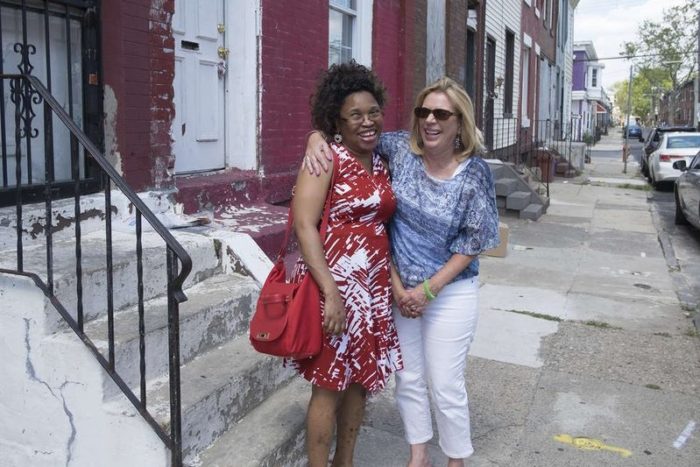
When Eric Smith was killed in a car accident, his mother, Mary decided to have his organs donated. One of the recipients was Arlinda Griffin, who got a kidney and his pancreas. But it didn’t stop there. Mary and Arlinda then met through the Gift of Life program and have become good friends. Here, Arlinda, left, and Mary greet each other outside Arlinda’s North Philadelphia home on August 26, 2016.
Courtesy of Ed Hille, Staff Photographer. The Philadelphia Inquirer
In what has to be the most wrenching time for a family – watching a loved one whose death is imminent – a crucial decision often has to be made.
Should the loved one’s organs be donated?
The people who approach the families to ask the question have a compelling offer: life for someone else.
We recently spoke with Howard M. Nathan, CEO of the Gift of Life Donor Program, the federally designated, nonprofit organ and tissue transplant network for eastern Pennsylvania, South Jersey and Delaware.
Founded in 1974, it is the oldest and largest of 58 such programs in the nation. The programs have been set up for one reason: to recover organs and tissue for transplantation into patients who need them.
Earlier this month, officials announced that this region’s program leads the nation for the tenth consecutive year, with 1,546 organs transplanted from 565 people.
Nathan has been with Gift of Life since 1978, and his first job was to approach families to ask that pivotal question.
Why is organ donation so important?
One organ donor can potentially save eight lives. By organs, we mean the kidneys, heart, liver, lungs, pancreas and intestines. And then there are tissues — corneas, bone for orthopedic surgery, heart valves. Skin is used for burn victims and reconstructive surgery. One tissue donor can change the lives of 75 to 100 people.
Last year in the U.S., 33,000 organs were transplanted. Almost two million tissue transplants were used in life-enhancing surgeries. All that comes from donors.
As for the need, 116,000 people nationwide are waiting for an organ transplant. Someone is being added to the list every eight minutes. Unfortunately, about 7,000 people died last year, waiting.
In our region, we’re going to perform more than 1,500 transplants this year. But 5,300 people are waiting for a transplant.
Learn more about organ donation by reading the full article here.
